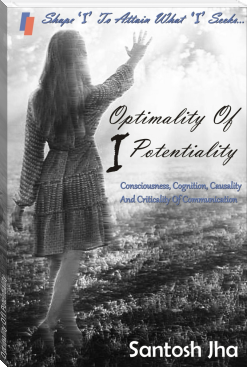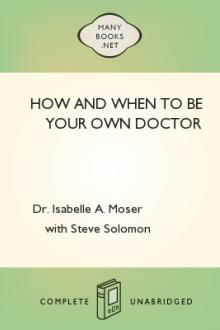Optimality Of I Potentiality by Santosh Jha (read after txt) 📖

- Author: Santosh Jha
Book online «Optimality Of I Potentiality by Santosh Jha (read after txt) 📖». Author Santosh Jha
In such an environment, decision-making is more tilted towards emotional rather than logical. Scientists confirm that this cognitive-conundrum is biological, part of our body-mind mechanism, which we have already stated. Science says, confusion and chaos makes one emotional in thinking and value-summation as limbic system is activated. So, emotions make the fine-line between optimum and maximum blurred. This prompts risky behavior, even though, the behavior is towards restoring the homeostatic equilibrium.
In modern environment, there is a sense of relative safety and stability. This also prompts people to take more risks in creating wellness. Then, people have their own levels of emotional value-summation. A person may react very deeply and heavily if divorced and start taking risky behaviors, another may move on. So, individual reaction to homeostasis requirements and allostatic corrections may vary.
Understanding the dynamics of homeostasis and its functional mechanisms give us great insight as we can understand our own internal design of things and external environmental factors that have the potential to disturb our balance and poise of life. Balance in modern environment is something so rare but this is what we all need to have. That’s why, understanding this poise in all aspects of life and living can help. It should.
This entire lengthy discussion on homeostasis was aimed at knowing and accepting the two core facts. First scientific fact is – the contemporary clutter culture is a dysfunctional and debilitating realism as it makes most of us land in chaos, conflict and confusion. This in turn lands us in a charged up emotional state affecting our logical and appropriate decision-making, as it blurs our perceptions about actualism of realism. The clutter culture affects our consciousness negatively and this in turn affects our cognition. Naturally, affected consciousness and illogical cognitions throws us in the deep oceans of bad and calamitous causality.
Second core fact emanates out of the first. That is; when the crucial 3Cs – Consciousness, Cognition and Causality are hit by another 3Cs – Chaos, Conflict and Confusion, we begin to lose the sense of appropriateness of self-awareness, self-control and self-actualization. That is why we begin to perceive some good and right things as bad and wrong and the vice-versa. This perception about the worth and utility of loneliness as some bad and wrong thing comes out of that situation, which most of us find ourselves deep into.
**
CHAPTER 5
Understanding Neuroplasticity In Detail
Let me tell you a story. Twin boys were born to a couple. One of them was healthy and normal but another had congenital heart trouble. The doctors declared that the unhealthy boy shall not survive long as his weak heart shall not allow him to see his third birthday.
The couple was strong and they decided to make everything count for the abnormal boy. They believed in their abilities and resolve. They took great care of this boy and made him live a life, which consciously consisted of all healthy efforts and practices. This abnormal boy had no choice as he did what his parents made him to. Destiny sure was changed as this boy lived for 80 long years, living within his limitations, but surely evolving everyday to attain in life what a normal person could.
However, his healthy brother, who was supposed to be normal and under no limitations, died at the age of 22. He was killed in a motorcycle accident, when trying to race it beyond reasonable limits. The couple believed this normal child was good enough to care for himself and therefore spared little attention for him. He was a mainstream person and lived a life even he didn’t choose for himself!
This is a metaphor of what plasticity is all about and how it writes its own beautiful script of life, which the decisive destiny makes no provision of. Neuroplasticity is a term, which has similar connotation, which we all must understand and accept as potent tool to override our destinies, adding all those beautifully endowed shades of life and living experiences, which destinies make little provision of.
Neoroplasticity is a term given to a mechanism, which is about physiological changes actually happenings in the brain states, brought about by mind consciousness. It refers to changes in neural pathways and synapses owing to changes in behavior, environment, neural processes, thinking, and emotions, as well as to changes resulting from bodily injury.
This is very real yet seems so magical and mystical. This shows how brilliant yet so complex and mesmerizing our body-mind mechanism is. What this magic is all about? The magic and marvel is about how the intangible elements of our life-living experiences become so powerful that they actually bring about tangible changes in the brain. The intangibles are behavior, emotions, thinking, attitude, orientation, resolve, etc. These intangibles are about our personal choices of conscious mind, which we put in place in our lives for certain desirable destiny. And, our brain responds to that. Sure, this stupid called brain is wayward and likes to be in the comfort of inertia, if we choose to be in the drift of our subconscious minds. However, the same brain becomes our great facilitator friend, the moment our conscious mind takes control and invests rightly in the intangibles. This as we now know, is a process called neuroplasticity, which signifies that destinies can be changed and this happens by actual and physiological changes in our brains.
In contemporary world, especially the developed societies, people are growingly accepting the realism that mind is the centre of all realism. The realism, we think as something external to us, in our pop belief, designing our destinies is a huge misnomer. The reality is – everything is engendered within us and we see only their images in the external world. What truly matters to us are not the tangibles but the intangibles.
Life is about plasticity, destinies we all have and end up with are about plasticity. That is probably why we have our brains, which also has plasticity. The neurons do it for us.
We cannot change things; we primarily cannot even know what needs to be changed. We cannot because, as science says, we buoy up and down in the vast ocean of sub-consciousness for most of our lives, only occasionally surfacing on the environment of consciousness. This happens to most of us and is surely aggrandized in those who live a life of drift and flux because of deep indulgence in the clutter culture, mad multitasking and instant self-gratification. We need to stop, keep away from this drift and think about self in a qualitative leisurely state of positive solitude about what changes we need to bring in our lives for our wellness. We then have to consciously bring in those relevant intangibles in our mind consciousness, which can effect physiological changes in our brains. This shall institutionalize wellness and goodness in our lives.
Millions of people all over the world have been into this meditation. Meditation is nothing but a conscious choice of our minds, to physically keep away from those tangible elements in our external milieus, which are causing drift and flux in our lives. And then, with practice, meditative loneliness consciously brings about the intangibles into our mind consciousness. Gradually, as our brains build up new and facilitative neural pathways and synapses, we begin to feel the joys and satisfaction of the true wellness and happiness. The brain changes physiologically and gets aligned to the actual wellness and happiness.
The human mind, the functional mechanism of brain structures, has instinctive mechanism to universalize goodness as well as evil. What we feed in it is not its concern. This is the role of intellect. The intellect is the intangible faculty to be in control of the instinctive as well as the culturally learnt behaviors, to objectively assess all life-living choices with holistic logic.
The universe has not put us where we are today with any specific purpose of designed goodness. We have to design our purpose. As we repeat this objective mind training to our brain, the objective goodness would spread all throughout its neural circuitry. The notion of neuroplasticity says that brain can actually create new pathways to institutionalize this objective goodness. And then, we won’t have to think twice to perform goodness, as it would then become an instinct, and thus an involuntary mechanism, like a hand moving away involuntarily as it touches fire.
It has to be understood and accepted with all humility and compassion that a real good human is not one who needs to think and then behave and act good. Rather, it is one who does not have to think, as all his behaviors and actions are instinctively bound to be good. We don’t consciously remember when we drive a car or cook a meal as it is instinctive, even when they were once learned behaviors. Objective goodness is also learned behavior. But when we repeatedly practice it, it becomes instinctive.
Neuroplasticity is also about this objective intellect. It is about consciously aligning with desirable intangibles of life and then practice them with mindfulness of higher consciousness, helped by meditation. This then becomes structured in our brains. This means, goodness and wellness is no more our choice, but it has become an auto-mode virtue, an option-less absoluteness for us.
**
CHAPTER 6:
Understanding ‘I-Mortality’ In Detail
We are about to deal with an idea, which has its origin over 3000 years back. It sure is tough to visualize a time that far in history but can understand it and feel it in our consciousness. It was time when there were very few people around and naturally, the level of proximity and intimacy between them was far deeper than today. The nature then was wilder and far more intense and people had to always remain in high awareness state to pre-conceive and pre-empt any probability that threatened their survival. Naturally, we can safely presume that average people had their consciousness in ‘Entropy-Expansion’ mode. In such world and life, it becomes so much easy and available to observe even the most intangible of feelings, emotions, ideas, patterns and structures.
Our early ancestors had little distractions of modern and contemporary life. As population pressure on natural resources was very little and needs of life were few, they probably had sufficient quality leisure time. The poise they had within and utility they accepted of this precious leisure, led them to be keen observers of every little thing around. They had to because in tough natural state, survival depended on ‘Aware-I’ mode life-living. They could decipher a design, a pattern, a ‘causality’ in almost everything that happened or presented themselves to them.
Humans have the most developed facility of observance and imagination. These two innate facilities made our ancestors decipher so many patterns in the nature and in their lives. They started to put them into actionable ideas. It is also very natural and we all even today do the same. Those were days, when our ancestors only had the human tools of observations and imaginations as means of corroboration. However, they had the genius to engender such ideas, which were self-evident and self-corroborative in their immediate milieus. They beautifully picked up symbols and metaphors from nature to elaborate and substantiate their ideas. They are part of philosophic and spiritual traditions but actually, they also happen to be the crude resource for scientific enquiry and substantiation. The core philosophy is based not on ideas, which modern contemporary world can label as pure imagination of idle and primitive minds. They can be accepted as observations of realisms, present in the cosmic mechanism and in the microcosm of





Comments (0)